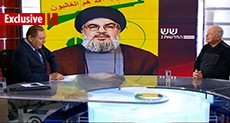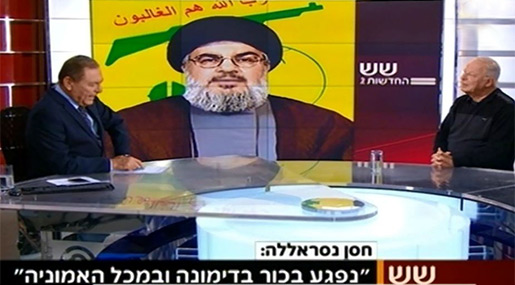
Sayyed Nasrallah’s Messages Resonate in Tel Aviv

Jihad Haidar
The "Israeli" media was unable to ignore the messages to the decision-makers in Tel Aviv by the secretary-general of Hizbullah, Sayyed Hassan Nasrallah.

His positions and warnings dominated the headlines of broadcasts across ["Israeli"] television channels and occupied an important place in the various "Israeli" newspapers that led to the positions of His Eminence being imposed as the top concerns of the "Israeli" entity. This is largely due to the credibility his eminence has among the public and decision-makers in Tel Aviv, in addition to the level of risk for the "Israelis" that the messages carried.
It is not an exaggeration to say that these messages were etched deeply in the minds of "Israeli" public opinion. These messages will also be the dominant feature at the decision making tables, forming the basis of the calculations when studying operational options. It is not difficult to predict that decision-making institutions in Tel Aviv will seriously consider the threats from His Eminence.
In the same context, the deterrence goals of the messages will dominate at the political, security and military apparatus in Tel Aviv. This strong presence - among other things - rests on the credibility enjoyed by His Eminence as well as the sensitivity and seriousness of the messages he sent.
- The only noticeable serious response to the Secretary-General was entrusted to the Minister of Intelligence Yisrael Katz, who threatened that "if [Sayed] Nasrallah dared to target the "Israeli" territory or hit the national infrastructure, we will respond by striking all targets available in Lebanon, impose sanctions that cripples Hizbullah's activities, exercise great pressure on Iran to stop arming and funding it, and dismantle the axis linking Iran through Syria reaching Hizbullah and Lebanon."
- Katz linked the possibility of striking deep into Lebanese territory with Hizbullah's initiative to carry out its threat. In return, Sayyed's hints of the option of targeting the ammonia reactor and the Dimona power plant came in response to a war "Israel" might wage against Lebanon. It is assumed in the light of this exchange of messages that Hizbullah will not take the initiative if "Israel" does not wage a war. "Israel" would not initiate [military operations] unless Hizbullah initiates this option. As a result, Hizbullah's deterrence goal has been achieved. This mutual restraint is but a manifestation of a mutual deterrence equation.
- Katz's call to impose sanctions, exerting pressure, and working on dismantling the resistance axis involves a strategy alternative to the option of a direct war, at least in the foreseeable future. These facts reflect that Katz's call, based on his position as minister of intelligence, was not just a reaction to the speech of His Eminence. It was also a compendium of deliberations that took place between the intelligence and operational apparatuses in Tel Aviv.
- Katz's call to exert pressure on the Islamic Republic comes due to its role as the source of support and supply for Hizbullah, on the financial and military levels. It is clear that this approach stems from the perception that the imposition of sanctions on Iran over its support for Hizbullah aims to "put a wedge between Hizbullah and Iran" [as Katz previously expressed] and in order to repeat the formula of sanctions against the development of Iran's nuclear program. In this case it is probable that the "Israelis" are betting on pushing the Iranian people to object to the high price for Tehran's foreign policy and not the national project [the nuclear program].
- "Israel" also aims to keep Iran under sanctions, even after the nuclear deal. Thereby, undermining potential economic achievements that the Islamic Republic was aiming for under the agreement.
Interestingly, despite the victories of the resistance axis on the Syrian front, "Israel" still sees the need to work to "dismantle the axis linking Iran through Syria reaching Hizbullah and Lebanon." This call involves the need to continue to work in other ways perhaps involving an attempt to influence the shaping of any formula related to the future of Syria, through Russia and the United States.
Katz intended to defame Hizbullah, accusing it of being an extension to Iran, when he announced that Sayyed "Nasrallah serves Iranian interests in absolute terms and that he is ready to sacrifice the Lebanese state to serve these interests." But his position also involves "Israeli" estimates that Hizbullah was ready to go all the way in case the Islamic Republic of Iran was targeted, which strengthens the equation of regional deterrence starting from Lebanon.
|sayyed hassan nasrallah|iran|dimona
Source: Al-Ahed Exclusive, Translated and Edited by website team



